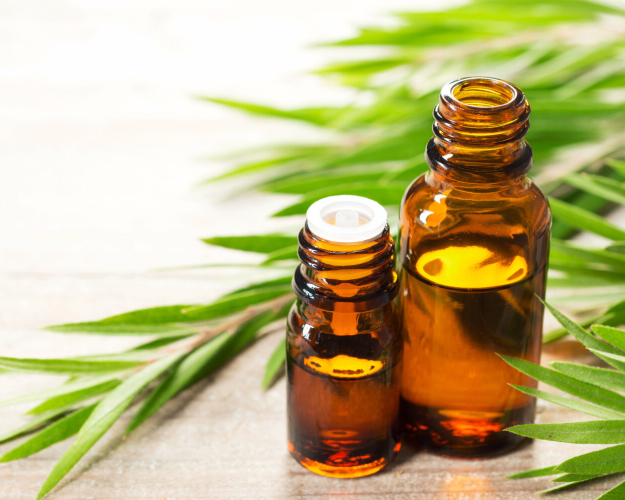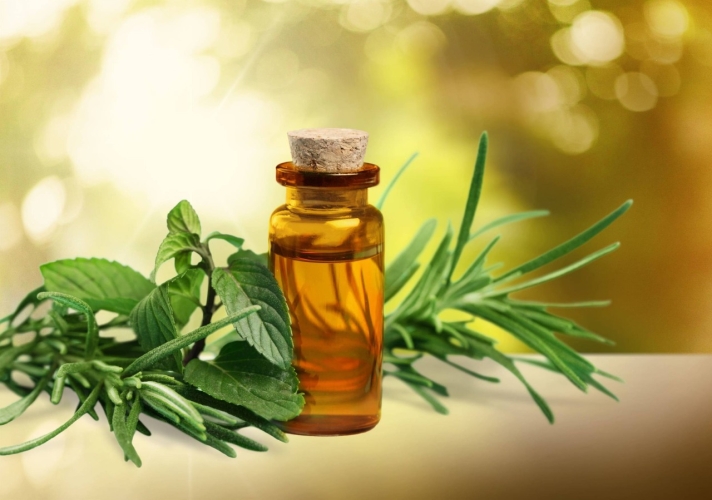The Comprehensive Guide to Tea Tree Oil: Benefits, Uses, and Precautions
Tea tree oil, derived from the leaves of the Melaleuca alternifolia plant, has gained widespread recognition for its powerful antiseptic properties and versatility in various applications. This essential oil, native to Australia, has been used for centuries by indigenous people for its medicinal benefits. In this article, we'll explore the numerous benefits of tea tree oil, its diverse uses, and important precautions to consider.
What is Tea Tree Oil?
Tea tree oil is an essential oil extracted from the leaves of the Melaleuca alternifolia tree, commonly found in Australia. Known for its potent antibacterial, antifungal, and anti-inflammatory properties, tea tree oil has become a staple in natural medicine and skincare.

Benefits of Tea Tree Oil
1. Antimicrobial Properties
Tea tree oil is renowned for its ability to kill a wide range of bacteria, viruses, and fungi. Its antimicrobial properties make it a popular choice for treating various infections and skin conditions.
2. Acne Treatment
Due to its antibacterial and anti-inflammatory properties, tea tree oil is highly effective in treating acne. It helps reduce redness, swelling, and the formation of new pimples, making it a popular ingredient in many skincare products.
3. Wound Healing
Tea tree oil's antiseptic properties promote the healing of cuts, scrapes, and other minor wounds. It helps prevent infection and accelerates the healing process.
4. Dandruff and Scalp Health
Tea tree oil is a common ingredient in shampoos designed to combat dandruff and maintain a healthy scalp. Its antifungal properties help reduce dandruff-causing fungi and soothe an itchy scalp.
5. Natural Deodorant
Due to its ability to kill bacteria, tea tree oil can be used as a natural deodorant. It helps eliminate the bacteria that cause body odor, providing a natural and effective alternative to conventional deodorants.
6. Oral Health
Tea tree oil is often used in mouthwashes and toothpaste due to its ability to combat bacteria and reduce inflammation. It can help prevent bad breath, gingivitis, and other oral health issues.
7. Anti-Inflammatory
The anti-inflammatory properties of tea tree oil make it useful for soothing irritated skin and reducing inflammation associated with conditions like eczema and psoriasis.
Uses of Tea Tree Oil
1. Skin Care
- Acne Treatment: Apply a few drops of tea tree oil diluted in a carrier oil (like coconut or jojoba oil) directly to pimples.
- Cuts and Scrapes: Apply diluted tea tree oil to minor wounds to prevent infection and promote healing.
- Razor Burn: Mix tea tree oil with aloe vera gel to soothe razor burn and irritation.
2. Hair Care
- Dandruff Treatment: Add a few drops of tea tree oil to your shampoo to help combat dandruff and maintain a healthy scalp.
- Lice Treatment: Combine tea tree oil with a carrier oil and apply to the scalp to help eliminate head lice.
3. Home Cleaning
- Disinfectant: Mix tea tree oil with water and vinegar to create a natural disinfectant spray for surfaces.
- Mold Removal: Apply tea tree oil to areas affected by mold to kill mold spores and prevent regrowth.
4. Aromatherapy
- Relaxation: Add a few drops of tea tree oil to a diffuser to enjoy its calming and refreshing scent.
- Sinus Relief: Inhale steam infused with tea tree oil to help relieve sinus congestion and respiratory issues.

Precautions and Side Effects
While tea tree oil offers numerous benefits, it's essential to use it with caution:
- Dilution: Always dilute tea tree oil with a carrier oil before applying it to the skin to prevent irritation.
- Allergic Reactions: Perform a patch test before using tea tree oil to check for allergic reactions.
- Ingestion: Never ingest tea tree oil as it can be toxic if swallowed.
- Pregnancy and Children: Consult with a healthcare provider before using tea tree oil on pregnant women or young children.
Additional Benefits
1. Insect Repellent
Tea tree oil is effective at repelling insects, including mosquitoes and flies. It can be used in natural insect repellent sprays or added to lotions.
2. Anti-Fungal Properties
In addition to combating dandruff, tea tree oil is also effective against fungal infections like athlete's foot and nail fungus. Its antifungal properties help eradicate these infections when applied consistently.
3. Anti-Viral Properties
Preliminary studies suggest that tea tree oil may have antiviral properties, making it useful in managing viral infections, although more research is needed to confirm these benefits.
4. Household Cleaner
Beyond its use as a disinfectant, tea tree oil can be used to clean various household items, including laundry and dishes. Adding a few drops to laundry detergent can help kill bacteria and keep clothes fresh.
5. Skin Conditions
Tea tree oil can help manage various skin conditions beyond acne, such as rosacea, contact dermatitis, and insect bites. Its anti-inflammatory and antimicrobial properties make it versatile for treating different skin issues.
Scientific Research
1. Antibacterial Activity
Research has shown that tea tree oil is effective against a variety of bacterial strains, including Staphylococcus aureus (responsible for staph infections) and Escherichia coli (E. coli). Studies have demonstrated that tea tree oil can inhibit bacterial growth and kill bacteria at certain concentrations.
2. Antifungal Efficacy
Studies have confirmed the antifungal properties of tea tree oil, particularly against Candida albicans, a common cause of yeast infections. Its effectiveness in treating fungal infections has made it a popular natural remedy.
3. Anti-Inflammatory Effects
Tea tree oil has been found to reduce inflammation, making it beneficial for conditions like eczema and psoriasis. Research indicates that it can decrease the production of inflammatory mediators in the body, leading to reduced symptoms.
4. Wound Healing Properties
Clinical studies have supported the use of tea tree oil in promoting wound healing. Its ability to reduce infection and inflammation helps accelerate the healing process of cuts, abrasions, and burns.tea tree oil
Comments
Post a Comment